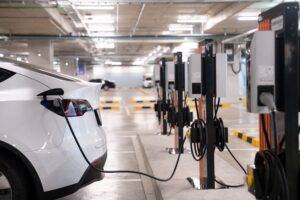
The shift toward electric vehicles (EVs) has opened up business opportunities in a rapidly evolving automotive landscape.
Among these opportunities lies the potential for EV charging to serve as a value-added service, offering an array of advantages beyond the conventional scope of business operations.
Unpacking Value-Added Services
Value-added services extend beyond a business’s core product or service, enriching the customer experience. They can range from extended warranties to additional support, enhancing customer satisfaction and overall brand value.
Consider a furniture delivery company offering assembly services or a mobile operator providing insurance for its products; these are prime examples of value addition.
When aligned with a company’s core offerings and in high customer demand, these services elevate the brand’s perceived value and fortify customer loyalty while attracting new clientele.
The Value of EV Charging as a Service
Although relatively new in the spectrum of value-added services, an EV charge station presents an enticing proposition for businesses across various industries.
Meeting Demand and Enhancing Loyalty
The demand for charging infrastructure has escalated with the surge in electric mobility. Studies reveal that the availability of EV charging significantly influences consumer choices, making it a pivotal factor for hotels or supermarkets. Businesses that embrace EV charging cater to existing customers’ needs while attracting a new segment—EV drivers—thereby fostering loyalty and expanding their consumer base.
Diversifying Revenue Streams
Whether monetized or offered as a complimentary service, EV charging stations can generate revenue. Even if the charging is free, customers spending on other products or services while their EVs charge can bolster profits.
Prolonging Customer Dwell Time
Charging sessions often extend customers’ stays, presenting opportunities for increased engagement and sales. For instance, in a shopping center, each customer’s average 2-hour charging session could translate to an extra 50 minutes of dwell time, potentially resulting in increased spending.
Industries Primed for EV Charging Benefits
While the advantages of EV charging as a value-added service are widespread, certain industries stand to gain significantly:
· Retail Chains: Shopping centers and supermarkets can witness increased footfall and sales by providing EV charging.
· Hospitality: Restaurants, cafes, and hotels can enhance customer experiences by offering charging facilities, thereby improving perceptions.
· Petrol Stations: Amidst changing mobility landscapes, integrating EV charging sustains relevance and diversifies business models.
· Parking Operators: Due to prolonged parking periods, existing parking lots and garages are prime locations for EV chargers.
Keys to Successful Implementation
To leverage EV charging as a value-added service effectively, businesses should focus on several key aspects:
· Needs Assessment: Analyze customer demand and site feasibility for optimal charging station placement.
· Accessibility: Ensure easy accessibility of charging stations for customer convenience.
· Information Dissemination: Inform customers about available stations and associated benefits via various channels.
· Pricing Strategy: Set charging prices considering overall business profitability.
· Maintenance: Regular maintenance ensures reliability and a positive user experience.
· Sustainability Communication: Communicate the commitment to sustainability to strengthen the brand image.
Final Thoughts
Integrating EV charging as a value-added service proves advantageous for businesses on multiple fronts. It fosters loyalty, augments profits, and enhances brand image. As electric vehicle sales continue to surge, businesses embracing this trend secure their market position and contribute to the proliferation of e-mobility.
Furthermore, the adoption of EV charging as a value-added service aligns with the growing global emphasis on sustainability and reducing carbon footprints. By facilitating electric vehicle usage, businesses also play a crucial role in reducing greenhouse gas emissions and promoting eco-friendly transportation solutions. This not only resonates with environmentally conscious consumers but also positions the company as a responsible corporate citizen.
In summary, integrating EV charging into your business operations is a forward-thinking strategy that not only benefits your bottom line but also aligns with broader societal and environmental goals, making it a win-win proposition for businesses of all sizes and industries.
Read more:
How Does EV Charging Enhance Business Value?




